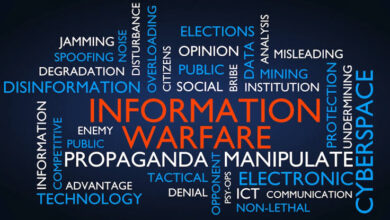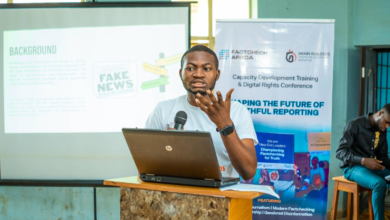
BY: Mustapha Lawal
Artificial intelligence is no longer a futuristic concept, it’s transforming journalism in real time. According to Muck Rack’s State of Journalism 2025 report, 77% of journalists now use AI tools in their daily work, with ChatGPT leading the pack. However, the rise of AI also intersects with a growing global crisis: the spread of misinformation and disinformation, particularly across digital platforms.
The State of Journalism 2025 report from Muck Rack is based on insights ( ±2.5% estimated margin error) from responses of 1,890 journalists surveyed between April 4 and April 30, 2025. After filtering out spam, duplicates, and low-quality responses, the final dataset, 1515 verified journalists across the U.S., U.K., Canada, India, and beyond, underscores the urgency of these shifts.
The survey highlighted several pressing concerns in today’s media landscape, among them, declining public trust, political polarisation, shrinking newsroom budgets, and increasing government interference. These challenges resonate deeply in African media environments, where press freedom and access to verified information are often under threat.
AI: A Tool, Not a Replacement
According to the report, nearly half of journalists now use AI for tasks like brainstorming, research, and drafting headlines. 77% of journalists that participate in the survey now use AI in their workflow, with ChatGPT leading as the most widely adopted tool. Others rely on AI for transcription (40%) and grammar refinement via tools like Grammarly (35%).
Yet, as AI becomes embedded in the craft of reporting, it also brings profound ethical and practical challenges, particularly in regions with underdeveloped media policy frameworks. Most newsrooms still lack policies to govern ethical AI use, leaving editorial decisions vulnerable to bias, automation errors, or overdependence on unverified machine-generated content.
At FactCheckAfrica, we recognize both the promise and peril of AI in journalism. Through our AI Journalism Fellowship, we’re actively training a new generation of African journalists to use AI not as a crutch, but as a critical-thinking companion. Fellows learn how to audit AI-generated content, maintain editorial integrity, and leverage machine learning to track disinformation patterns.
Misinformation, Disinformation, and Media Vulnerability
One of the most alarming revelations from the report is how disinformation campaigns are growing more coordinated, more believable, and more dangerous. Fueled by synthetic content, these campaigns erode public trust, sway elections, and undermine democratic institutions. More than a third of journalists identified disinformation and misinformation as the most serious issues affecting journalism today, according to the report.
In Africa, the problem is amplified by linguistic diversity, low digital literacy in many communities, and the absence of robust platform accountability. Whether it’s false election results, manipulated health claims, or fabricated conflict reports, the threats are deeply localized, and rapidly evolving. Access to credible information, which remains uneven in the African context, makes this even more dangerous. Whether it’s fake election results, conspiracy theories, or incitement to violence, falsehoods spread quickly, especially where social media is the primary news source. This poses a serious threat to journalistic integrity and safety. And in such tense environment, misinformation spreads faster than ever
Journalism’s Economic and Emotional Toll
Over half of journalists remain cautiously optimistic about their careers. As Gregory Galant, Muck Rack’s CEO, observes: “The definition of a newsroom, and journalism itself, is changing.” As the definition of journalism evolves, more journalists are working independently, publishing outside traditional newsrooms, and monetizing their content. Despite their resilience, journalists face widening workloads and shrinking safety nets. According to the report:
- 62% have taken on more responsibilities in the past year.
- 47% describe their work as exhausting.
- Over one-third now self-publish, and 61% of those monetize their independent work.
- Only 60% say they have adequate tools and training.
The report also found that Facebook has now overtaken X (formerly Twitter) as the most valuable tool for journalists (27% vs. 21%). LinkedIn, Instagram, and newer platforms like Bluesky are gaining traction as sourcing and promoting stories. Yet, more than half of journalists (58%) expressed concern about harassment and reputational risks, with many quitting at least one platform in the past year.
The shift is also altering how public relations professionals engage with the media. While 84% of journalists say PR pitches influence their work, only 3% report that pitches consistently match their needs, highlighting a growing disconnect between content creators and information gatekeepers.
Building Resilience Through Media and Digital Literacy
This is where FactCheckAfrica’s wider mission comes in. Beyond reporting, we invest heavily in community-facing education. Our Media and Digital Literacy Program has reached hundreds of journalists, educators, and students across Nigeria and West Africa. By teaching how to identify manipulated content, verify sources, and recognize bias, we’re building an informed public that’s harder to mislead. Additionally, we’ve piloted an AI-assisted fact-checking tool: MyAIFactChecker tailored for African media environments, supporting multilingual data extraction and real-time verification.
The Future of Journalism: Local Innovation, Global Relevance
The Muck Rack report makes it clear: the future of journalism depends not just on adapting to technology but mastering it responsibly. For African newsrooms, that means combining local context with global tools, and ensuring that AI enhances, not replaces, the journalist’s role as truth-seeker.
FactCheckAfrica is committed to leading that charge. Whether through AI innovation labs, education, digital literacy, and localised fact-checking, FactCheckAfrica is not just reacting to global trends, we are actively shaping Africa’s response to the crisis of disinformation. As public trust hangs in the balance, our collective commitment to truth, transparency, and technology will determine the future of the African information ecosystem.




